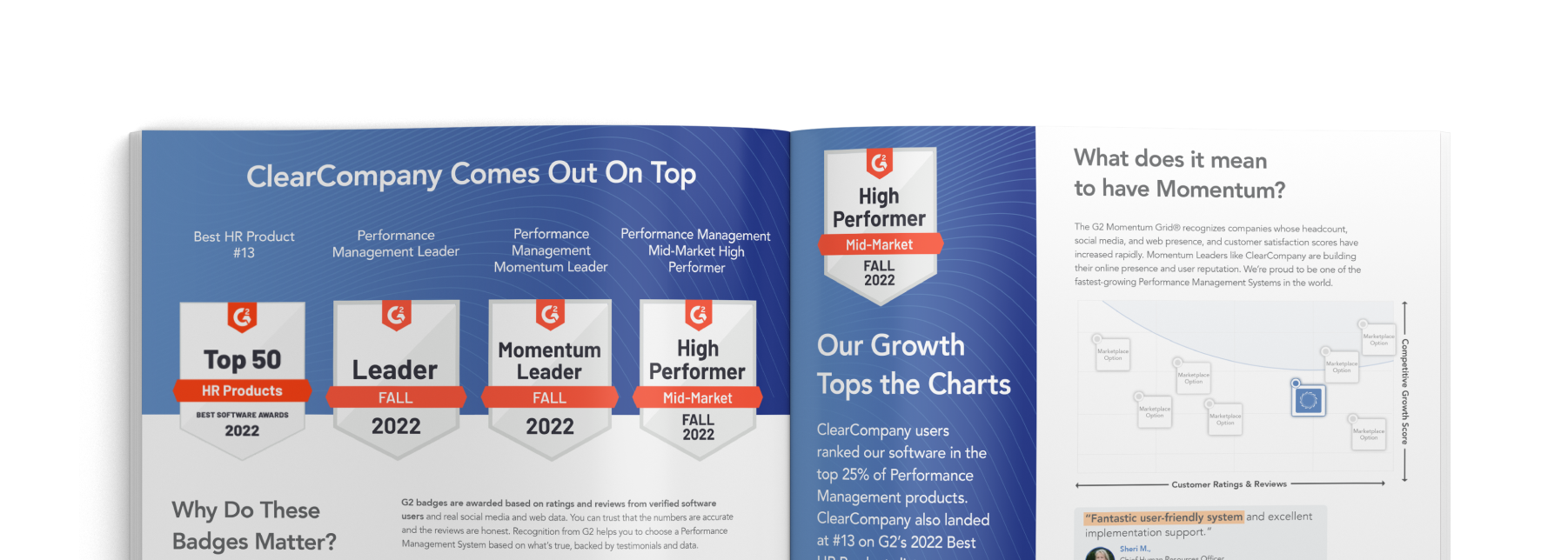When people think of human resources, they usually think of duties like payroll, benefits, and PTO before they think of strategic responsibilities like company culture, employee engagement, and performance management. But for most teams, that changed as the pandemic hit and HR was the organizational glue that kept operations running. HR emerged as a clear strategic business partner after navigating the nuances of managing people through a pandemic.
SHRM reports that this is a role your HR team should expect to occupy permanently. “HR has cemented its position as the right hand of the CEO, helping navigate complex people-centric challenges,” Naveen Bhateja, chief people officer and executive vice president of Medidata Solutions, told SHRM.
Is your HR team new to its position as a partner in business strategy? Are you looking for ways to grow your team’s influence and get leadership on board with HR initiatives? Look no further — learn why HR strategy is so important to the business and how your team can solidify HR’s place as a consequential business function.
#HR strategy has emerged as essential to business success — find out how your team can work more strategically:What is Strategic Human Resources Management?
With a human resources management strategy, your HR team operates the big picture in mind and aligns company goals with HR strategies that power innovation and growth. Teams taking a strategic human resources management (HRM) approach have a plan for every hire — and a hiring process that sets new employees up for long-term success. They don’t rush to fill positions but take their time identifying what kind of candidate they’re looking for to ensure a good fit.
Their other HR functions are strategic, too. Onboarding, engagement, and employee performance are not just superficial processes — they’re designed to make employees feel welcome, supported, included, and motivated from the time they apply until offboarding. The goal of strategic HRM is to hire, retain, and engage employees that bring in new skills and expertise, a variety of experiences, and add to company culture.
Why Strategic HR Management is Important
Strategic HRM is important because, without a strategic plan, companies are likely to overspend on hiring and battling high turnover. It’s also nearly impossible for a business to achieve its goals when employees lack the required skills or are constantly quitting. When HR lacks strategy, employees are simply hired to fill open roles. Beyond that, there’s little thought given to why that particular hire was made, like skills gaps that need to be filled or the employee’s potential for growth in the role.
Strategic HR practices mean that every new hire is hired not because the company needed a position filled, but because the employee’s unique skills and experience are the best fit for the role. Strategic HR teams don’t send out employee surveys without analyzing the results or schedule annual reviews with no plans for discussing performance otherwise. With an HR strategy, companies can better understand why employees chose to work there and what makes them stay. They can spot and address underperformance, provide coaching, and recognize employees’ great work.
People are the foundation of your business. If they are not supported, disengaged, or just not the right fit for their role, their performance — and consequently, the business’s performance — will suffer. Strategic HRM enables companies to make better hiring decisions, provide the support employees need, and keep them on board for years to come.
“The week that trillions of dollars of market value came out of the global economy because people could not work and consume and live normally—that really ended any debate over the value of HR to the enterprise. HR’s seat at the table was solidified permanently.”
- John M. Bremen, Managing Director of Human Capital and Benefits at Willis Towers Watson
How to Be a Strategic HR Team
Managing employees strategically requires honesty, transparency, communication, and trust. It requires a team of HR professionals who can develop effective strategies that connect directly to business goals. For example, if one of the business’s goals is to increase diversity across the company, a strategic HR department might set its own goal to increase the diversity of its talent pools. Then, they figure out how to reach that goal — maybe by exploring new candidate sources or assembling a more diverse hiring panel.
Take a look at these steps your HR team can take to be more strategic.
Evaluate current strategies
Before developing any new HR strategies, review your current processes. What’s working? What clearly needs to change? Your team may already have an excellent employee referral program, but high turnover among new hires indicates your onboarding program needs attention.
Set aligned goals and plan how to reach them
Your business’s goals should be the North Star for your team’s goals. Each time you set team and individual goals, connect them to overall business goals and make a plan for how you’ll achieve them. Making this connection not only helps the business achieve those goals but serves to engage and motivate your team.
For a strategic approach to #HRManagement, ensure your team’s goals align with business goals. Find out more from @ClearCompany:Recognize strengths and weaknesses
In order to develop an effective strategy, a great HR manager must be aware of the HR strengths and weaknesses of their team. Your team may be excellent at hitting hiring goals, but managing a regular performance review cycle is difficult. Maybe your team lacks a dedicated candidate sourcer, but recruiters are great at doing their own sourcing. Whatever your teams’ strengths and weaknesses, when you know what they are, you can set realistic expectations, leverage strengths, and work on weaknesses.
Find gaps in talent
Finding skills gaps is an important component of strategic HRM. What skills does your workforce currently have and which skills need to be added? Are any of your current employees good candidates for upskilling, or will new hires be necessary to close the gaps? No matter what you discover, uncovering skills gaps helps your company build a well-rounded, productive workforce.
Upgrade HR skills and resources
Your HR team is made up of employees, too, so don’t forget to treat them as such. Identify the skills gaps among your team members so you can help strengthen them or if a new hire would be necessary. This can also reveal if your team could benefit from technology tools like a human resources management system, an ATS, performance management software, or a complete talent management platform.
Evaluate the results of new strategies
As with any new initiative, it’s essential to watch how new HR strategies perform. You don’t want to continue putting effort into a strategy that isn’t working. Monitor your strategies to ensure they’re producing the desired results, or reevaluate and try something new.
Strategic HRM is worth the time and effort. It helps HR build a workforce with the right skills that can help the business meet its goals. HR strategy provides direction, enables growth, and solidifies HR’s status as a highly influential department and business partner.
How to Shift to Strategic HR Management
You can power a strategic HR management plan by utilizing ClearCompany’s Talent Management Platform. Our software has the tools and features your team needs to find top candidates, make smarter hiring decisions, and support employee engagement and retention:
- Robust Applicant Tracking System (ATS) for a consistent candidate experience
- Texting tools for fast, engaging communication
- Onboarding tools help new hires start their jobs seamlessly with confidence
- Performance review tools to manage productive performance conversations
- Employee engagement surveys and recognition tools to motivate and retain A-players
Help your HR team work strategically and your company meet its goals with ClearCompany. Get your own personalized demo from one of our product experts today.


